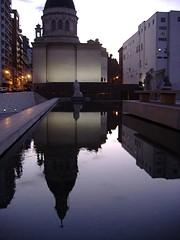You may or may not remember Antonio Baseotto, the last bishop of the institution that grouped the military chaplains. Baseotto, an anti-Semitic, pro-dictatorship right-wing fanatic, used to enjoy a juicy wage paid by the State. Argentina not only pays salaries to the Catholic Church hierarchy, but in addition, Baseotto was deemed to have a job of spiritual assistance to the troops. Long story short, he said something he shouldn't and was fired by the Argentine State, but the Vatican refused to acknowledge the dismissal. From that moment on, the relationship between Argentina and the Church deteriorated. The very idea of the Military Vicariate was questioned. It was created during the dictatorship of 1957 through a Concordat (the same kind of treaty that saved the Pope from being expelled from his lands by Mussolini, or the one that preserved the privileges of the Church during Germany's Third Reich). It means discrimination in favour of the Roman Catholic Church. It imposes religion on the troops. It's a financial burden for the state, too.
From that moment on, the relationship between Argentina and the Church deteriorated. The very idea of the Military Vicariate was questioned. It was created during the dictatorship of 1957 through a Concordat (the same kind of treaty that saved the Pope from being expelled from his lands by Mussolini, or the one that preserved the privileges of the Church during Germany's Third Reich). It means discrimination in favour of the Roman Catholic Church. It imposes religion on the troops. It's a financial burden for the state, too.
So these days, Congress is deciding what to do with this link to medieval times, and from the looks of it, it's going to be a big no, even though not everyone agrees. Some say spiritual support is absolutely needed by the troops; some say that's OK but they can go to their regular church if they do need it; others say it's OK to have a chaplain in the war front, but not in peaceful times like these.
What I think is, there's a lot of politics here, but aside from that, a lot of confusion, fostered by religion and by our culture. "Spiritual" doesn't mean "religious". In my experience, very religious people are often less, not more, spiritually advanced than the rest. They cling to their little god and their small-minded prejudices under the guise of dogma, and they don't see the big picture. They have a twisted, one-sided view of the world and of human nature. That's for starters.
Secondly, and this is obvious, having a Roman Catholic chaplain in a country where many people aren't Catholics is discrimination, plain and simple. If a soldier really needs spiritual assistance from a religious "professional", we must suppose he needs someone who shares his same religion. One can hardly expect a Jewish soldier to be consoled by references to a Jesus Christ who welcomes heroic soldiers in the heavens. (If you heard somewhere that Argentina is a Catholic country, now hear this. Most Catholics in Argentina are only nominally so. Catholicism is in retreat. Even the Church acknowledges that most baptized people only go to church once or twice a year, or on special occasions such as weddings.)
Third, you might believe that the State, which puts the soldier in a position where he may be killed for his country at any time, should make sure that he gets spiritual assistance, by paying religious institutions to provide priests, rabbis, or whatever, just as it provides for other needs. This is debatable, but consider it from the other side. Religious institutions who are granted the right to embed their preachers into the Armed Forces, like those who work in prisons and asylums, are given a prime opportunity to evangelize and indoctrinate — they get to the people when they're the most vulnerable, the most permeable to suggestion. Why should we pay religions to indoctrinate our soldiers?
I'd pay if soldiers got real help. But since I don't believe that praying with the troops or sprinkling them with "holy" water is of any value, I won't pay. Let the religious institutions fight for their place, and support themselves. By paying bishops and chaplains, we're in effect supporting the Church with a tithe we didn't sign up for.
It's already preposterous to treat this tiny piece of land inside Rome as if it were a country, worthy of consideration and respect from the rest of the nations. If it weren't for historical and cultural reasons, the Pope would be shunned by the leaders of most civilized nations as what he is — the top of the hierarchy of a theocratic dictatorship, with views ranging from the bizarre to the outright dangerous, and an undue, and bad influence, on pressing world matters (such as the prevention of the spread of AIDS).
The Concordat gives the Vatican some powers that no country has on the soil of other sovereign country, and privileges that no sectarian group should enjoy in a modern society. So I say to Congress, end this ridiculous thing already!
15 February 2008
Out with the old
Subscribe to:
Post Comments (Atom)













No comments:
Post a Comment
Note: Only a member of this blog may post a comment.